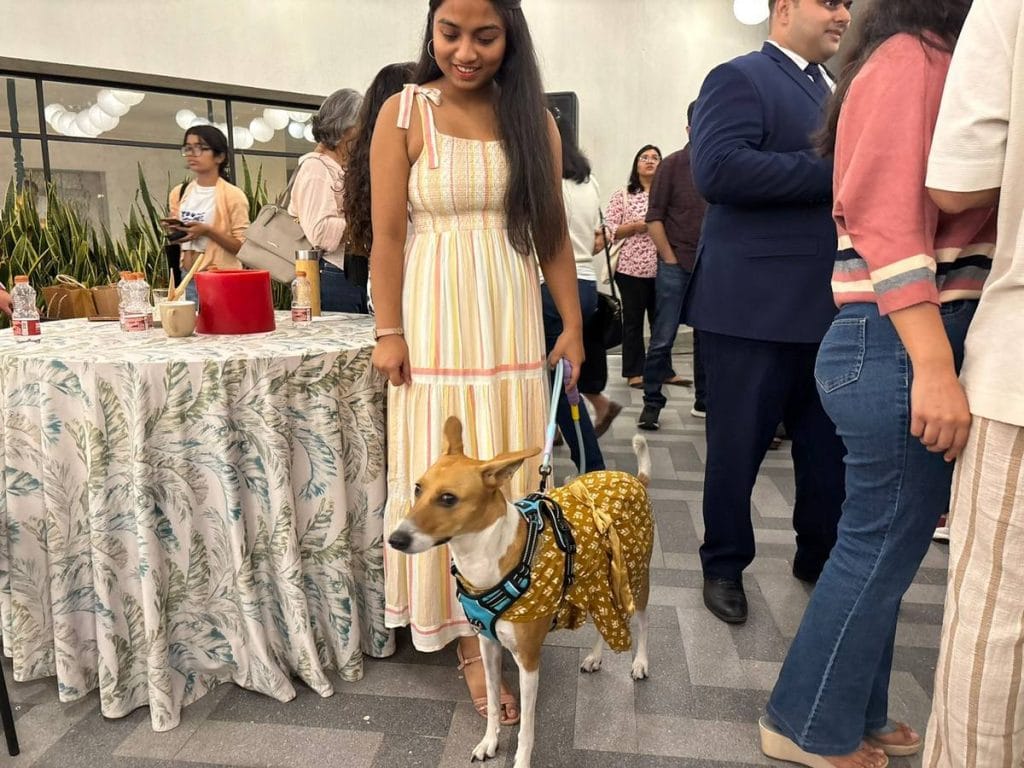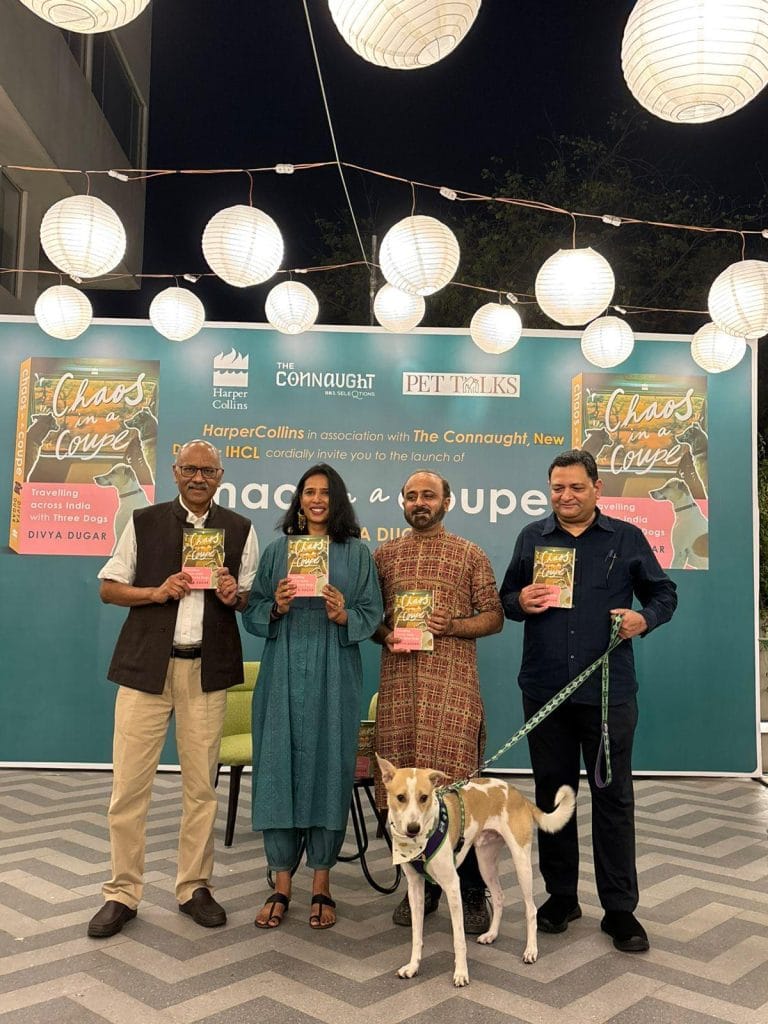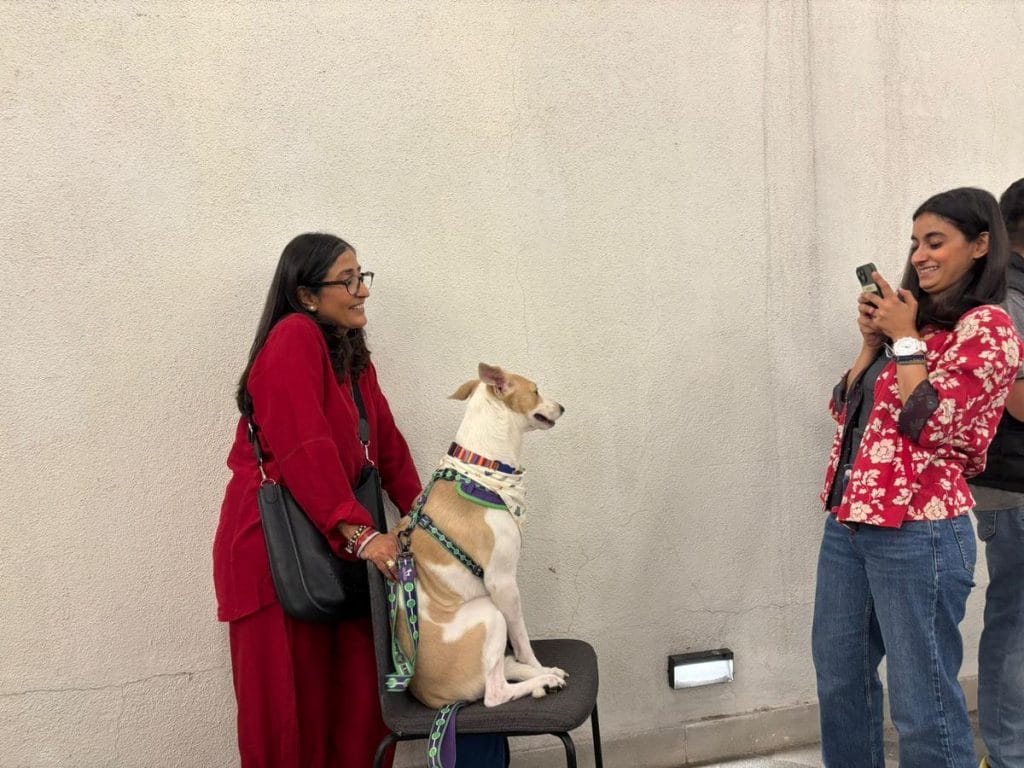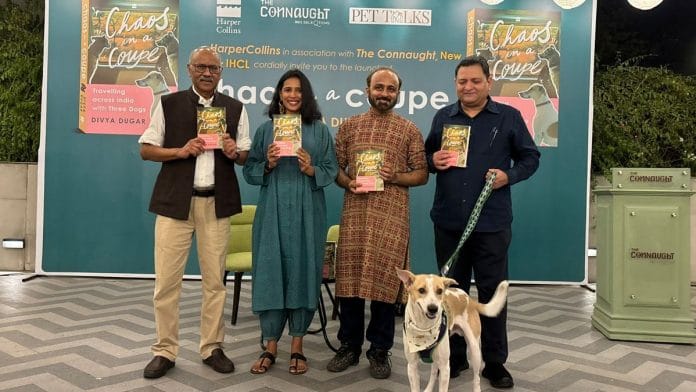New Delhi: Indies, labradors, and beagles in pink bows, tiny scarves, checkered dresses, and even little kurtas trotted into The Connaught hotel on Monday evening. They weren’t there for a fashion show but as guests — at a book launch. They curled up on the floor, peeped out of tote bags, wagged at strangers, and posed for photographs.
In her book Chaos in a Coupe, author and journalist Divya Dugar writes about her three rescue dogs — Tigris, Marco Polo, and Pari — and the 75 train journeys they’ve taken with the family across India.
“It started with a train ticket, three dogs, and no plan. And that’s how the Indian Railways became the biggest character in my life and in my book,” said Dugar.
The ride has been hairy at times — sharing space with strangers, standing at ticket counters, and spending hours on platforms awaiting different approvals to find a seat in train coaches that never factored in dogs as travel companions.
The chief guest was journalist and ThePrint Editor-in-Chief Shekhar Gupta. As he walked toward the podium, some dogs in the audience barked.
“They are talking,” Gupta said, as the room burst into laughter. “Every person has a dog story.”
He recalled flying with his dogs in the 1980s, when airlines weighed each pet. “Our lhasa, whom we called mota lovingly, weighed 13 kg, and it was difficult to navigate that.”
Back in the day, Gupta added, people would feed their dogs cough syrup so they’d sleep through long flights with many stops. Trains, he said, offered “more space, but have their own complexities.”

The senior journalist also told the audience about his 1983 interview with Sunil Gavaskar, who was “terrified of dogs”. Even Gavaskar’s teammates joked about locking a dog in his hotel room to scare him.
Nearly a decade later, when Gupta met him again and asked if he was still afraid, Gavaskar said: “Too many of my friends have dogs, so I made peace with it.”
Gupta said the book shows people they don’t need to fear dogs.
“The problem is we are scared of dogs, even those who do pro-dog activism,” he added. “The book serves the purpose of evangelising dogs.”
Also Read: A Halloween walk, a book launch, and Delhi people. It was a date with the djinn
A journey to love
When Divya Dugar moved to Delhi as a 20-something, she was yet to discover her love for dogs.
“I grew up in a very Marwadi family. No one rescued dogs. We didn’t have one,” she said.
When she was 22, working as a journalist with a French television channel based near Nizamuddin, she had the chance to interact with dogs. Many would sit near the office entrance, and she’d often encounter others on her way back home.

One such dog was Rani, who was later named Tigris.
“I met Tigris in Nizamuddin. She was my office dog. I remember one day, she was running from one direction and I was running from the other. That one moment and that dog changed my life,” said Dugar.
Tigris stayed by her side for 15 years.
It was grief, however, that made travelling with her dogs a part of Dugar’s life.
A ticket to heal
When Pondi, one of Dugar’s beloved dogs, died, it made her acutely aware of how little time she had with the others. So she proposed an idea to her husband, Olivier Telle.
“I told Olivier that I love to travel, and I want to travel with my dogs. We have such limited time with our pets. It is the shortest love story.”
For the couple, driving long distances was tiring, and flying with their dogs was even harder. That left one option: Indian Railways.

“India is not the best country for road trips, so we started reading up on the rules and regulations of Indian Railways,” she said.
That was nearly 10 years ago. There was no guide, no blog, no Instagram reel explaining how to take a dog on a train. Back then, only Army and police personnel used first-class coupes to move with dogs.
One day, Divya walked into Nizamuddin railway station and told the station master, “I want to travel with my dog.”
“He looked at me as if I was about to rob a train,” she laughed. “But that’s where the journey began.”
The whole neighbourhood knew that Dugar was trying to get that coupe — the vegetable vendor, the auto-rickshaw driver, the garbage lady, even her grandparents. Everyone prayed for it to be confirmed.
When the couple finally got two seats and a coupe on the New Delhi-Madgaon Rajdhani, it was a 30-hour journey. Inside the small wooden compartment, with its foldable table, mirror, and a fading Incredible India poster, began their first extraordinary journey.
“Once we sat inside, I felt liberated,” she said. “When you are a pet parent, everyone tells you your life is restricted. But I knew this was possible, and I could crack it. I told myself, if I can do this one journey, I can travel anywhere in India.”
Also Read: Dogs built human civilisation. Calling them a menace is betrayal
Getting others on board
For many in the audience, Chaos in a Coupe was more than a travel memoir. It was a manual for pet parents and reassurance that long journeys with dogs were possible.
Khushboo Ojha, founder of FurGetAway, a pet travel company, said the book fills a big information gap in India.
“Not many people know how to travel with their pets — the rules, the routes, the paperwork. Divya’s book gives people that access to the world. It is a bridge between pet parents who dream of travelling [with their pets] and those who never believed it was possible.”

Some readers said Dugar’s story had already changed their lives. One of them was Shivani, mother of an Army officer, who stood with her dog Mr Grey beside her. He wore a scarf and appeared in nearly every photograph taken at the book launch.
“Grey is here because of Divya,” she said.
Shivani’s daughter rescued him as a tiny pup in Secunderabad but later had to move to Assam. And so Shivani decided to adopt him.
“The catch was, how do we get him to Delhi? I contacted Divya, she guided me.”
That one journey became several. Grey has travelled 40 hours by train with his family by his side.
Dugar ended the session on a heartwarming note. As people gathered for signed copies of the book, she pulled out a personalised ink stamp of the paw print of one of her dogs.
“I hope this remains a memory for each one present here,” she said.
(Edited by Asavari Singh)






